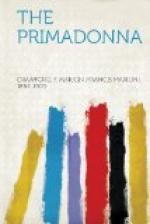There was only Logotheti to remind her of her everyday life, for Griggs did not do so at all; he belonged much more to the ‘atmosphere,’ and though she knew that he had loved in his youth a woman who had a beautiful voice, he understood nothing of music and never talked about it. As for Lady Maud, Margaret saw much less of her than she had expected; the hostess was manifestly preoccupied, and was, moreover, obliged to give more of her time to her guests than would have been necessary if they had been of the younger generation or if the season had been winter.
Margaret noticed in herself a new phase of change with regard to Logotheti, and she did not like it at all: he had become necessary to her, and yet she was secretly a little ashamed of him. In that temple of respectability where she found herself, in such ’a cloister of social pillars’ as Logotheti called the party, he was a discordant figure. She was haunted by a painful doubt that if he had not been a very important financier some of those quiet middle-aged Englishmen might have thought him a ‘bounder,’ because of his ruby pin, his summer-lightning waistcoats, and his almond-shaped eyes. It was very unpleasant to be so strongly drawn to a man whom such people probably thought a trifle ‘off.’
It irritated her to be obliged to admit that the London financier, who was a professed and professing Hebrew, was in appearance an English gentleman, whereas Konstantinos Logotheti, with a pedigree of Christian and not unpersecuted Fanariote ancestors, that went back to Byzantine times without the least suspicion of any Semitic marriage, might have been taken for a Jew in Lombard Street, and certainly would have been thought one in Berlin. A man whose eyes suggested dark almonds need not cover himself with jewellery and adorn himself in naming colours, Margaret thought; and she resented his way of dressing, much more than ever before. Lady Maud had called him exotic, and Margaret could not forget that. By ‘exotic’ she was sure that her friend meant something like vulgar, though Lady Maud said she liked him.
But the events that happened at Craythew on Sunday evening threw such insignificant details as these into the shade, and brought out the true character of the chief actors, amongst whom Margaret very unexpectedly found herself.
It was late in the afternoon after a really cloudless June day, and she had been for a long ramble in the park with Lord Creedmore, who had talked to her about her father and the old Oxford days, till all her present life seemed to be a mere dream; and she could not realise, as she went up to her room, that she was to go back to London on the morrow, to the theatre, to rehearsals, to Pompeo Stromboli, Schreiermeyer, and the public.
She met Logotheti in the gallery that ran round two sides of the hall, and they both stopped and leaned over the balustrade to talk a little.
‘It has been very pleasant,’ she said thoughtfully. ’I’m sorry it’s over so soon.’




